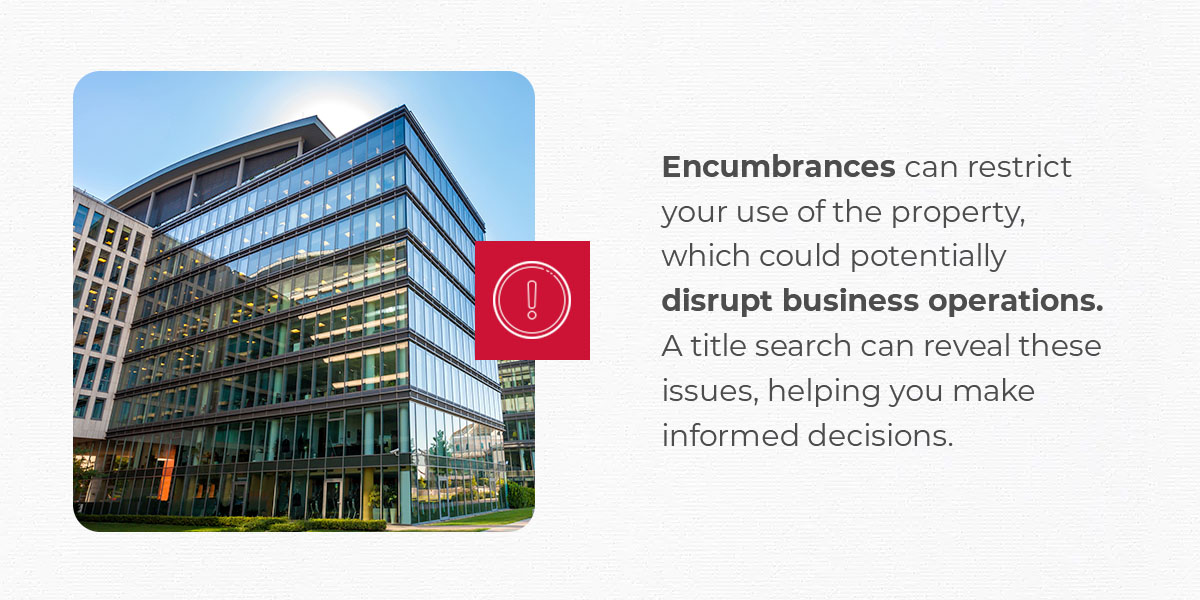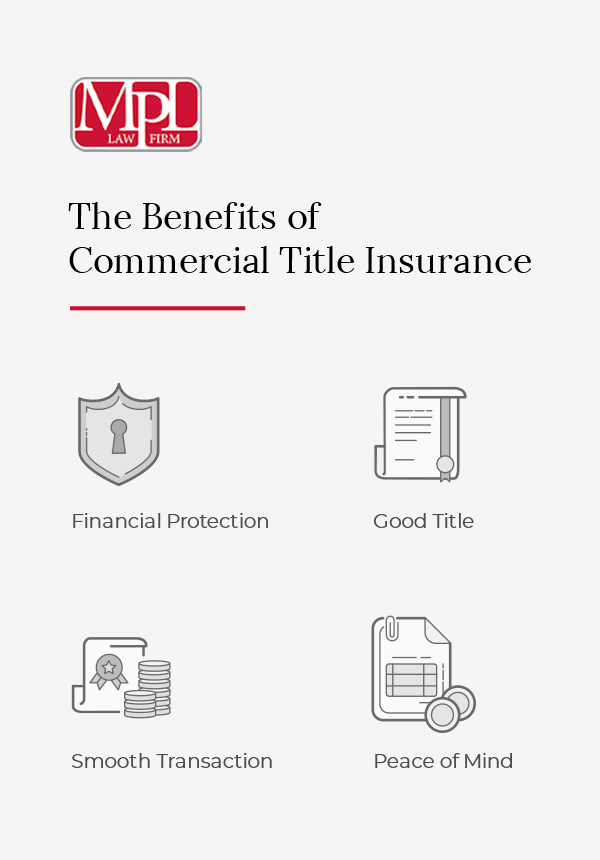A Comprehensive Guide to Commercial Title Insurance
What is commercial title insurance? Are there benefits to purchasing title insurance coverage for your commercial real estate property? If yes, what are they, and how can you get the ideal coverage?
Commercial title insurance offers protection to business owners acquiring real estate properties. In Pennsylvania, getting coverage is mandatory for properties secured by a mortgage but optional when you pay cash. Regardless of the situation, it’s wise to protect yourself and your business by considering the potential risks.
What Is Commercial Title Insurance?
Commercial title insurance is a unique coverage that protects the policyholder against financial losses resulting from issues with the property title. Purchasing a commercial property involves the transfer of title, which encompasses the owner’s rights and interests in the property. However, there are instances where a person’s property ownership may be challenged for one reason or another, even though they possess the deed.
Title insurance may reimburse you for your losses when another person establishes a claim against you regarding the property’s ownership. The payment may be partial or full, depending on the circumstances and terms of the policy. Again, title insurance mitigates the legal risks of acquiring a defective title. Before the insurance is issued, a thorough investigation is done to verify the property’s true owner. Flaws identified along the way may then be corrected if possible.
Here are two scenarios to help you understand the concept better:
- You search and find the perfect real estate property to start your business. You make the payment, sign the paperwork and move in, only to find out three months later that there is a lien on the property. You never knew about the lien, but a financial institution insists you have to pay an outrageous amount to prevent them from exercising their rights. The insurer may incur the covered expenses arising through the claim, regardless of its validity.
- You purchase a newly constructed commercial property but later learn that the seller had no right to sell the property. They knew the property was given to another person in a will, yet they went on to sell it as if it were theirs. In resolving any issue with the actual owner, the insurance company may cover your expenses and reimburse you fully or partially if you lose the property, depending on the extent of coverage.
What Are the Types of Commercial Title Insurance?
There are two types of commercial title insurance.
- Lender’s title insurance: This type protects lenders when legal issues arise regarding title to the property. It reassures the lender regarding the priority, validity and enforceability of its mortgage or lien. In Pennsylvania, title insurance is mandatory for real estate purchases secured by a mortgage.
- Owner’s title insurance: This type protects the property owner from claims against the title that predates their purchase of the property. It makes the insurance company financially and legally responsible for title issues that arise during or after the purchase, subject to the terms of the insurance contract. Title insurance is optional if you pay cash for the property, but it’s highly recommended.
What Does the Title Search Entail?
Title search is integral to the commercial title insurance process. It requires the insurance or settlement company to investigate the ownership of the property and resolve the defects. This review is thorough but necessary before you go to closing. Common title issues that may be uncovered include:
- Property disputes: There may be boundary disputes or issues with the interest in real estate being transferred. For example, the dimensions or location may differ from what was promised or the interest could be a life estate instead of a fee simple.
- Falsified documentation: People sometimes create false documents like a fake title chain. This fabrication conceals the rightful owner, making the sale challenging.
- Falsified identity: Like falsified documents, a person may also impersonate the property owner to deceive the buyer. A proper title search may reveal such discrepancies or offer a defense if the fact remains hidden after a diligent search.
- Estate problems: As earlier discussed, inheritance issues sometimes spring up in commercial property transactions. These issues can jeopardize the deal unless it is appropriately handled.
- Public record errors: Clerical or filing errors exist, which can affect the validity or accuracy of documents. It helps to work with an experienced professional with an eye for detail.
- Encumbrances: An encumbrance is a claim against a property from someone other than the property’s owner. Encumbrances can restrict your use of the property, which could potentially disrupt business operations. A title search can reveal these issues, helping you make informed decisions.
- Liens on the property: Liens enable creditors to assert rights over a property. Liens can arise in many ways, such as mortgage debts or unpaid construction services. Resolving such issues can eliminate unexpected financial burdens.
- Building code violations: Breaches in building codes can affect commercial property transactions, so it’s best to do comprehensive due diligence before finalizing the agreement.
The Benefits of Commercial Title Insurance
Purchasing commercial title insurance has many benefits for your business.
1. Financial Protection
The primary advantage of commercial title insurance is its protection to property owners. Although a thorough investigation may be conducted when purchasing a commercial property, some title defects are latent. Here are three common examples:
- Undisclosed heirs: There are instances where unknown family members make claims to properties. Classic examples include the assertion of gift or inheritance, especially when the original owner died intestate, or without a will. These claims may result in lawsuits, which can cause you to incur financial losses.
- Conflicting wills: Wills are designed to facilitate a smooth transition of assets but can sometimes cause title disputes. This is particularly true when the testator — the person making the will — executes multiple conflicting wills. In other cases, the validity of a will may be challenged, which, if proven, can affect your ownership of the property.
- Fraud and forgery: Detecting fraudulent transactions is sometimes challenging, even after thorough due diligence. Title insurance can protect you in such situations, providing a safety net against unexpected losses.
Commercial title insurance also protects lenders against financial losses. It covers the collateral lien placed on the mortgage, protecting the lender’s security interest in the property.
2. Good Title
Before getting commercial title insurance, a thorough search is conducted into the ownership of the property. This process can reveal title defects or undisclosed interests, helping you to establish a good title. Due diligence also mitigates the risk of disputes.
In the event of a lawsuit, the due diligence conducted as part of the commercial title insurance processes can be used as a legal defense. For example, the purchaser of the commercial property may assert to be a bona fide purchaser for value without notice. A bona fide purchaser is a person who takes title to property without actual or constructive knowledge of any claim to the property after making reasonable inquiry.
3. Smooth Transaction
Before issuing a policy, the insurance or settlement company extensively searches the property’s ownership. Doing so helps uncover potential issues like encumbrances, liens and conflicting interests. It also offers the opportunity to rectify defects, ensuring the buyer gets a marketable interest in the property.
By identifying and addressing these potential issues, the parties gain confidence in the transaction and are likely to close earlier. It often makes the processes seamless and eliminates unnecessary delays, surprises and complications. Parties can negotiate with clarity and certainty, especially when time is of the essence.
4. Peace of Mind
Knowing you are protected when investing in a commercial property is a relief. Commercial property insurance provides that much-needed safety net, allowing you to enjoy the property with less worry on your shoulders. The insurance company assumes responsibility for future title issues subject to the terms of the agreement, allowing you to focus on growing your business.
Besides the financial safeguard, commercial title insurance reduces the risk of disputes. As a business owner, having fewer legal challenges helps with anxiety. It eliminates emotional stress and lets you plan your business for future generations.
What Does Commercial Title Insurance Cover?
Here are examples of coverage you get from commercial title insurance:
- Title defects, including incorrect deeds, fraud and forgery
- Competitive claims
- Undisclosed liens, such as unpaid contractor invoices, mortgages and taxes
- Boundary disputes
- Encumbrances like easements
- Errors in public records
What Does Commercial Title Insurance Not Cover?
Commercial title insurance does not typically cover the following:
- Title defects created after signing the policy
- Building code violations after signing the policy
- Liens created by new property owner
- Non-compliance with laws on behalf of the new owner
How to Get Title Insurance for a Commercial Property
Here is the step-by-step process for getting commercial title insurance:
1. Research Title Insurance Companies
There are different ways to get commercial title insurance in Pennsylvania. The first is contacting an insurance company directly. The second is working with settlement agents. Each has its benefits, but checking the company’s track record, experience and customer relations is essential before making a decision.
Title agents or attorneys with insight into real estate transactions can guide you in helping you get the ideal coverage. They can conduct the necessary research and coordinate with reliable insurance companies on your behalf.
2. Provide Property Information
The insurance company or title agency will typically inquire about the property and ask you to submit certain documents regarding the property address, description, purchase agreements and mortgage. It’s essential to be transparent and honest to enable the insurer to conduct proper due diligence.
3. Conduct Title Search
The title agent or attorney working with the insurance company will search the property’s history to identify possible defects. This process will include examining public records, surveys, deeds, identification documents and other relevant information.
If the agent or attorney discovers title defects, they will try to resolve them. The resolution may involve getting further documentation to establish a clear title, clearing outstanding liens or addressing ownership issues.
4. Review the Commercial Title Insurance Policy
The insurance company will issue a title insurance policy once the title search and defect resolution are complete. The policy will provide the terms of the coverage, including the amount and exclusions. It’s essential to review the agreement carefully before you sign it. If you have any questions, consult the attorney for an explanation.
5. Pay the Premium
The commercial title insurance premium is usually a one-time payment. The amount will depend on factors like the property’s value. Additional fees may include expenses incurred during the title search and professional services, typically paid at closing or settlement.
The Advantages of Working With a Commercial Land Title Insurance Company
Working with a reliable commercial title insurance attorney comes with many advantages.
- Knowledge and experience: Settlement agents and real estate attorneys understand the nuances of commercial property acquisitions. They also have experience addressing complex issues that typically arise during settlement. Real estate attorneys can conduct detailed investigations and provide tailored advice.
- Professionalism: Real estate attorneys are supervised by regulatory bodies and are required to uphold high ethical standards, ensuring professionalism.
- Thorough examination: Real estate attorneys are effective at risk assessment and management. They can anticipate potential defects and implement strategies to resolve them, which saves you money and time.
- Efficient claim resolution: If undetected title issues arise, real estate attorneys can help you resolve them. They have experience in dispute resolution and possess the resources to achieve the best possible outcome. Plus, they can work with the insurance company to activate your protection under the coverage if you have a valid claim.
Factors to Consider When Choosing a Commercial Title Insurance Company
Here are four vital points to consider when choosing a commercial title insurance company in Pennsylvania:
- Experience: Select a company with a good track record of underwriting title insurance for businesses. They should also understand your needs and be capable of offering personalized services.
- Coverage: Compare the insurer’s coverages and exclusions with others before making a decision. The goal is to sign a contract that offers sufficient protection.
- Pricing: When it comes to title insurance, the cheapest option is not always the best. Instead, consider factors like return on investment when searching for a partner.
- Customer service: Check whether the estate attorney has excellent client relationships — testimonials speak volumes about their credibility and professionalism. Select a company that is responsive and available to provide the needed support.
How Much Does It Cost to Get Commercial Title Insurance?
The cost of commercial title insurance varies from case to case. It depends on factors like the insurance premium, title search cost, professional fees and miscellaneous expenses like recording fees, settlement fees and deed preparation. Factors that influence the insurance premium include:
- Price of the property
- Loan amount
- Location of the property
- Condition of the property
- Property history
Is commercial title insurance more expensive than residential title insurance? Considering that commercial properties are generally larger, they’re more likely to cost more. The most important thing is partnering with a reliable real estate attorney and insurance company with the experience to deliver the best possible results.
Contact MPL Law Firm Today
MPL Law firm underwrites commercial title insurance for Stewart Title and Guarantee Company through our licensed settlement company, MPL LandServices, LLC. We provide full-service representation for escrow services and real estate closings.
Our professional team is supportive, honest and transparent, aiming to offer cost-effective yet efficient services to clients and striving to form long-lasting relationships. If you want to ensure a smooth transaction when purchasing or selling your commercial real estate property, contact us now.






